|
VISIT OUR MASSES and HOMILIES ONLINE! CLICK BELOW TO WATCH
St. Elizabeth of Ravenna Catholic Church
*** ANNOUNCING: NEW BOOK RELEASE FEBRUARY 2022 ***
Ethnic Atlas of the United States: National Maps 1980 - 2020

This ethnic atlas from Earthhealing, Inc. and published by Brassica Books, has been a work in process for over 40 years, perhaps longer than most research projects -- and involving the same three people over that multi-decade period. This book contains five specifically colored national maps from 1980 - 2020, showing ethnic pluralities of every U.S. County (3,126) using racial and ancestral data drawn from the last five federal decennial Censuses. Textual highlights are included about each state and major ethnic groups represented.
Obtaining a static overall view at one time has some merit, but a more challenging puzzle is to describe the changing face of ethnic America over time, a truly social, ecological, cultural and environmental issue worth pursuing. We strive to record how variation in 80 racial and ethnic groups have changed in all U.S. geographic areas over this recent half century period. When comparing the entire map series, one discovers the distinct flavor of America's major ethnic groups; remember that behind the scenes a wide variety of minor groups exist and even thrive. An environment in which diversity is both recorded and celebrated is an enriching one and is worth celebrating.
Observing ethnic shifting is itself dramatic and can be partly realized by comparing the five general ethnic/racial maps that have been standardized to contain the same color codes and groupings. Increasing mobility of the American public complicates the ethnic picture; it tends to erode certain concentrations of ethnic groups and causes a greater intermixing of new communities.
We are all ethnics to some degree; it is just that other issues in life often erase this focus. In the deep-down heart of things, most people would like to uncover more about their own roots and share them with others. Many agree that cultural differences, when celebrated and respected, add to the rich totality of the American experience. For this reason, we encourage the people who take pride in their ethnic backgrounds to celebrate and enjoy their togetherness when gathered at given opportunities. In many cases, this sharing extends to outsiders who venture into such gatherings and are welcome. Thus, we hope that this continued cultural consciousness will help in the global collaboration needed to save our wounded earth.
Digital eBook available at Amazon.com
Earthhealing Team – Al Fritsch, Janet Kalisz, Mark Spencer
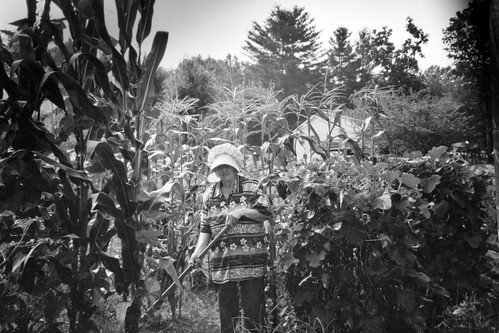
Working in the garden at age 92.
(*photo credit)
May 1, 2022 Earthhealing and Life's Final Journey
I tell you most solemnly, when you were young
you put on your belt and walked where you liked;
but when you grow old you will stretch out your hands,
and someone else will put a belt round you
and take you where you would rather not go.
(John 21:18)
We are at the third Sunday of Easter with its magnificent Gospel story (John's Chapter 21). Let's reflect on the words that Jesus said to help Peter overcome his denial and reaffirm his commitment to follow the Lord. The risen Lord extends forgiveness and an added mission to Peter to feed his lambs and sheep. Then comes the above passage in which the final journey of Peter's life is a road to Calvary that is part of the road of all Christians.
We are all too often in Peter's predicament, haunted with the imperfections of our past, and yet simultaneously confronted with a grand invitation to follow the Lord in the final leg of life's journey. A "Hail Mary" pertains to that final hour of life and stresses its importance. Healing involves acceptance of being healed and a willingness to look principally ahead and not behind. The horizon looms before us, a magnetic pull that stirs the creative juices of our final mortal lives. The Church grows in age and wisdom over time and its members continue to mature.
I read this passage from John Chapter 21 to Virginia who did not want to go to a senior citizens' residence for her final period on Earth. She had been independent until her ninety-seventh year but, being a long-term earnest school teacher, she listened intensely to the passage. Her faithful church attendance had allowed her to hear these words during many Easter seasons. However, only in old age did it strike home. During the ensuing weeks her friends said she read that passage to them. Yes, loss of independence is like being led away and having our feet and hands nailed to our cross. Still amid suffering we all, especially elders, discover Jesus' personal invitation to a final move.
Our journey of life has had its moments of joy and sadness. We take what comes and make the best of it. We make models of others who endured their successful final journey, and surrendered their will to the Creator of all. We are really not in charge, but it may take a lifetime to figure this out. The Lord is the master director and, when we understand this, we discover a deeper comfort from within. Our independence must be surrendered sooner or later. Immobility sets in through illness and age. All we can do is take our cross and walk beside Jesus on the way to Calvary. We are not alone but he is directing us, encouraging us, and supporting us all the way. We may deceive ourselves to think we are distant from those ultimate moments, but are we really?
Prayer to St. Joseph the Trusting Worker: Holy guardian of the Redeemer, Spouse of the Blessed Virgin Mary. To you, God entrusted his only Son; In you, Mary placed her trust; with you, Christ became man. Blessed Joseph, to us too, show yourself as father and guide us in the path of life. Obtain for us grace, mercy, and courage, and defend us from every evil. Amen.
Pope Francis' Prayer
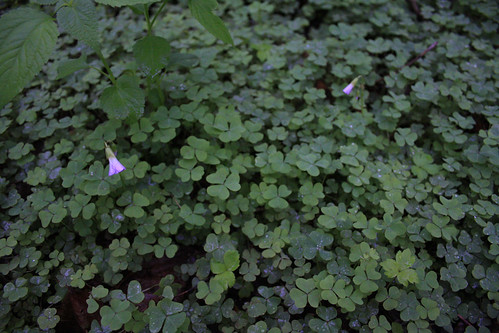
Violet wood-sorrel, Oxalis violacea.
(*photo credit)
May 2, 2022 Recounting the Earthly Joys of Our Faith
We believe that the joys of heaven and angelic choirs await those who toil patiently and are right with the Lord. What we seldom enumerate are the joys that can accompany this life, no matter how trying the circumstances. Try listing such joys:
* Christ is a constant loving and merciful companion on our trying journey;
* He is willing to converse at all times, for we are confident prayers are always received;
* The sacramental life gives us a warm feeling even in times of depressing conditions;
* Forgiveness is promised and actualized, and so we are potentially able to live a new life after overcoming misdeeds;
* Prayerful requests are answered with certainty, even though at times we must trust unexpected results are for our betterment;
* Situations that seem so difficult are resolvable through our constant trust in God, even though some come to fruition after our passing on.
* Work done with sincerity has meaning and thus we are able to see the benefits of our labors;
* Memories of loved ones are warm with the sure hope that we will be reunited with them after our passing;
* The promise of eternal life lightens our journey and keeps any shadows of a cold grave at a distance;
* Concerns about others have a fuller sense of compassion, for we are working with the Lord;
* Our community of believers gives us constant support in times when we really need it most;
* Calvary and Resurrection are extended in space and time and so we are participants in these powerful sad and happy events;
* We experience a maturing in our spiritual growth over time with the help of God's grace;
* We begin to see more clearly the face of Christ shining up to us from all creation;
* Morality becomes a better signpost in our lives as we grow in confidence that the Lord will help us through temptations;
* Heroic people who pass on are not really cut off from us, for our community extends beyond the grave;
* We are gratified by living examples of people who truly believe and give us courage by their lives;
* Service has many gratifying experiences that when reflected upon give great pleasure;
* Gratitude for being allowed to live at this moment in history along with a flood of gifts give further joy;
* Confidence that the world will survive its turmoil even though we may not know how; and
* Aging gracefully and appreciating all the God-given gifts of life comes more easily.
Saint Athanasius: We are strengthened in remembering your feats, St. Athanasius, for when the whole world seemed to move to the Arian view, you held firm to Catholic doctrine -- and your teaching ultimately prevailed. Pray for us that your tenacious dedication to truth might remain firm within the Church at this time and that morality may conquer the forces of secularity, with its view that people can do anything they want. You suffered from your position, but your courage prevailed. May ours as well!
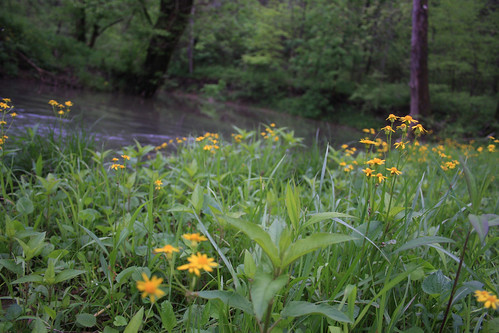
Golden ragwort, Senecio areaus.
(*photo credit)
May 3, 2022 Coupling Healing with Earth: Various Meanings
A simple Google word-search shows the average browser that two words in their variations of "Earth" and "healing" have been used by this site for the past four decades. However, others, for a variety of reasons, use the coupling as well, and so for a number of years groups who are unrelated have earth and healing titles. Some regard themselves in tune with Earth's "healing powers" and thus transmit this to their clients; other users have potions, assorted objects, and practices with the powers of "Mother Earth" to help themselves or others to be in tune with the rhythms of Earth. We are not interested in enumerating or describing the variations, but to emphasize great differences in name use.
Healing of Earth means for us on this website that we as believers (and often designated as Christian believers) are able with God's help to heal and save our wounded and threatened Earth. This healing needs to be authentic and effective, and so practices of simple living and alternative lower-impact energy sources are championed. Our "Earth Healing: A Systems Approach to Resource Use" operated for two decades and assisted some 200 non-profit institutions in 33 states and 2 Canadian provinces in setting up programs to make their properties greener. We published a book entitled "Earth Healing" in 1995 and reissued this (www.BrassicaBooks.com) in 2011; we have a video by Seascapes Publishing called "Healing Earth: Our Common Blessing." Of course, readers realize that "Earth Healing, Inc" has been around for two decades as a Kentucky-incorporated non-profit program; it focuses on addressing the environmental crisis.
The difficulty is not coming from traditional "healing and earth" users who have their own practices and potions, but from new entries in the field who consider using the name in an environmental manner, but who do not necessarily progress beyond first or second levels of eco-awareness (pollution real or threatened, and remedies and lifestyle changes). A basic diagnosis of Earth's maladies (first level of eco-awareness), or to taking some of the palliative approaches to the problem such as living a simplified lifestyle or replacing fossil fuels with renewable energy sources (second level of eco-awareness) are not sufficient. Our problem is with those who regard themselves as healing without going beyond comforting treatments of a troubled world. Is that healing?
Failing to pinpoint the underlying cause of environmental crisis for fear of alienating donors is a great disservice to a name; it belittles the difficult tasks of looking more deeply into the causes of the environmental crisis. Yes, certainly it involves economics; better, it's social and political economics. Healing must refer to addressing the rampant materialistic consumer culture that must be replaced by a more just economic system using renewable energy sources. This can only be achieved by turning to a Higher Power for assistance.
Saints Phillip & James, Apostles: Lord Jesus, you chose both Phillip and your cousin James to be Apostles. They eagerly learned from you, accompanied you in healing and teaching ministries, and reassembled after your death and resurrection to help lead the Church. James became leader of the Jerusalem Christian community. In your name they both accepted martyrdom. Through their intercession may we also be enabled to follow in your footsteps and be of service in bringing Good News to a misguided world.
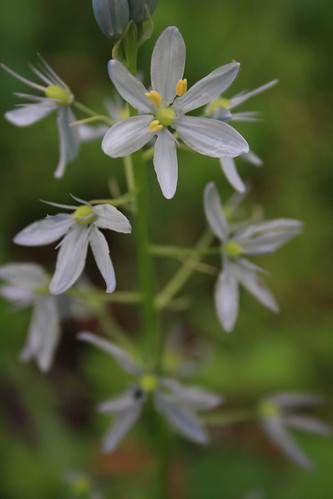
Wild hyacinth, Camassia scilloides, by creekside.
(*photo credit)
May 4, 2022 Listing Flower Benefits during Wildflower Week
Lovers of flowers know their value. Fifteen years ago, this website started adding flower photos at the beginning of each month and then expanded this to some of the daily reflections. We have also added the homegrown feature of simple poems about flowers of the month as an additional perk. This brings us to a number of ways for earthhealers to express themselves through flowers:
1. Aesthetic -- Encourage others to discover and express the beauty of flowers and why these attract everything from insects to human beings, who like added beauty in otherwise drab lives. My own love of flowers comes through my family, and on returning to ancestral Alsace and the Rhineland I saw floral testimonies: from window boxes to traffic circles and from cemeteries to walkways.
2. Pedagogical -- We learn much about the diversity of all creation by studying the various flowers we find in the wildlands or in cultivated plots. Maybe it is impossible for us to remember the various common or scientific names, but simply inspecting their shape, color and growing habits allows us to gain floral knowledge.
3. Psychological -- Those who are isolated or ill are assisted in their recovery through a gift of flowers in ways no one can fully appreciate. Depression is overcome, and thus the environment is better for recovering mental health through flowers.
4. Artistic -- There is something enticing in either photographing flowers or in arranging cut flowers for a bouquet in a home. The latter artifact is of short duration unless the living art piece is photographed or painted, but it tells something about the arranger. In a diverse floral landscape one can observe a palette of vegetative beauty that can furnish changing color and shade on a daily basis.
5. Entertaining -- Those who care for flowers find great enjoyment in the work involved; they regard floral work a rich form of recreation, often in solitude except for flowers.
6. Ecological -- The proper placement of flowers in a lawn, garden, or individual plots has a sense of completeness. Some flowers discourage pests while others attract pollinators; they serve as instruments for balancing the growing season in a friendlier manner.
7. Economical -- Flower-growing is a prize fully worth the effort and of small price compared to the many economic benefits associated. Floral presence enhances the value of property, just as trees do. Flowers attract visitors and tourists, and give a sense of wellbeing to a community.
8. Creative -- When flowers are included among the creatures we admire, we find inspiration that allows us to be creative in the ever-wider world around us.
9. Spiritual -- I am convinced that God speaks to simple folks through flowers, especially in times of the passing of a loved one. The pain of death of another is overcome through blooming flowers, God's gentle comfort to us all.
Prayer for Horse Lovers: Creator Lord, you give us companion animals to make our lives more pleasant. With horses, many people moved about before there were powered vehicles, and we once regarded them as essential. But they are more; there is a sense in which horses know us and recognize that we know them and appreciate their presence. Lord, may we grow in our respect for all life and deepen our love for your creation. May horses continue to sensitize us to your great glory and always be our friends.
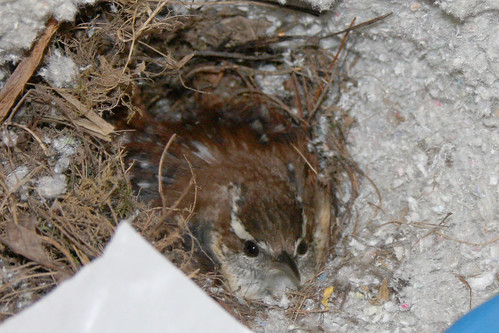
Carolina wren on nest.
(*photo credit)
May 5, 2022 Testing Academia: Who Pays the Piper Calls the Tune
A few years back a professor at a university told me that he would never be able to say everything that appears in the content of these Daily Reflections and remain in his illustrious position. This triggered my thoughts because I regard myself as a conservative when it comes to social and financial affairs. My political thoughts may extend beyond the confines of this educator's range of expressed opinion, but are they really unable to be expressed at certain places? Why can't professors espouse radical views?
Accountability. The pandemic has brought about changes in the way we conceive of things of importance; the manner of teaching in times of lockdown has taken novel roles; in many places the ability of lower-income students to come to institutions, and teachers to teach in classrooms has been cast into question. There's fresh thinking going on in the massive multi-trillion-dollar enterprise called academia. Perhaps financial responsibility is not the total picture, though the call today is for introducing radical programs.
An ongoing related issue is expectation by wealthy donors as to what is taught at the institutions where they are bestowing their "charity." The subtle control of the contents of the teaching profession does not allow people to talk about the dysfunctional and unsustainable economic system in which we are immersed, and the need for future change in the governance of our world from the local to the global level. Uncontrolled global capitalism must be confronted, but the academic world should be concerned about social justice issues. Who dares bite the feeder?
Theoretically free. Perhaps some schools will allow a stray professor to speak of such matters, but not all. Theoretically, the academic can say what he likes, but he or she cannot become too vocal, for the stream of charity may be diverted to far more status quo competitors. It is no accident that the public interest movement did not start with academic roots, for it would have been too restrictive.
Practically confined. Strangely, what I say is not so heretical from the secular standpoint, but it is from a prosperity Christianity position. Here we constantly insist that the root of the environmental crisis is consumer addiction, foisted by a commercial media in alliance with an economic system fostering ever greater consumer demand for resources. Current piety sees troubles elsewhere and skips around the private sector respect for the "divine right" of the wealthy. Shouldn't the religious academic community be the most radical critics of the system? The piper's tunes coming forth from these institutions have little or nothing to do with the real world with a crisis triggered by and retained by uncontrolled wealth and its profiteers. Where are the learned prophetic calls which ought to come from academic halls?
Prayer for Sowers: Lord, we are aware that sowing is so different from harvesting. Sowers do not have the joy of the harvest completion, only the anxiety and concern at the beginning of the growing process. While not sorrow, there is anticipation and hope for a good growing season. We come with doubts as to how successful the expending of valuable seed will be, and think of the need to sow environmentally renewable methods in hopes for a controlled climate. May what we hope for in sowing be fruitful!

New spring growth of the Christmas fern, Polystichum acrostichoides.
(*photo credit)
May 6, 2022 Healing Earth and Nursing Qualities
This is National Nurses Week and worth celebrating those who are primary caregivers in our world, especially after our two-year experience with the pandemic. Granted, most nurses with numerous patients have their hands full; are they expected to be environmentalists as well? Maybe so, for in their lives they are so down-to-Earth and not some sort of nebulous idealists telling others what to do. Nurses do the dirty work that others hesitate to do, and they do this cheerfully and with an air that caregiving is not perfect, but still essential for those who are ill.
I come from a family that has about as many caregivers as farmers: three aunts led the way and six first cousins were nurses and two others became medical doctors -- and one brother a health industry consultant. The next two generations have a number as well, practicing or on the way. Health care is a prime concern in a world where the Commons must be reclaimed so that all have a higher quality of life -- the universal right to good health opportunities. The challenge in the immediate future is to make health care available, and this will take untapped resources and personnel. It can be done if we put our mind and heart to it!
Earthhealing offers a promise that the insurmountable tasks before us are able to be realized, even amid our own limitations. Nurses are not miracle workers and yet what they do manifests the miracle of life itself. Our living Earth is a miracle in its own right, and to be down-to-Earth means being well founded and immersed in the real tasks ahead of us. Even when energy lags, nurses remain as cheerful as possible and attempt to raise the spirits of those in their care. These caregivers work long hours and under conditions that would try many of us. They deserve what they earn and give far more than what is expected.
Nurses have many general characteristics that should be regarded by all budding Earth healers. They have to be proficient and practical within the healing process, not expecting the impossible; one cannot become a lone ranger in health care, for it takes teamwork. The Earth caregiver must also stay pleasant, even when conditions seem quite dire all around; they must keep steady and exude a sense of hope. Health of our Earth is the caregiver's goal, and it involves more than some technical remedy or practice. When something goes wrong, the team sizes up the situation and makes proper adjustments. Earthhealers must champion teamwork.
Nurses are practical people; they are not idealists, but know the real situation; they let patients see that they care for them no matter how dire the situation. To sufferers, nurses are committed to extending good quality of life. They combine technical skills with compassion and concern; they realize their limitations and serve as models for healers of Earth.
Prayer for a Sense of Direction: Holy Spirit, help us never to lose direction in our journey of faith. Nothing is so confusing as to realize we do not know the proper directions, that we are lost, and that it is difficult to readjust to where true north is. We in the journey of life fear losing direction to Heaven through sinful allurements. Keep us pointed properly and not be afraid of what lies ahead. Lord, become our permanent compass.
IMPROVING OUR SOCIAL SERVICE IN TROUBLED TIMES
The collective news of climate change, pandemic, Ukraine and inflation wears on many of us, and affects some of our neighbors even more than others. Our efforts to soften the situation come into question, and in this beautiful month of May with nice weather and many flowers, we resolve once more to serve others as best we can. Here are three possible choices for improving our service – and these will vary according to your temperament and circumstances. After casting about I settled on these areas of improvement for myself:
Contact frequently. A number of my acquaintances suffer from ailments or have illness in their household – and we know they could use cheering up at times. There are creative ways of conversing and speaking about good subjects without recounting the bad news. Too often I only call when necessary and keep conversations deliberately short – and that is subject for review when others need support right now. Something tells us to make the call or write the email. Some will say they get too many messages, but all too often critical ones are a great help to a hurting person, no matter if they are mixed in with a non-wanted assortment. Our selection requires our better judgment – and even once made it may be apparent that the receiving party wants more silence.
A random hello. An additional contact with a stranger may prove fruitful in quite a number of cases. They may want someone to speak with them in these pandemic times.
This is a harder one for me, since I am hard of hearing and unsure before speaking to someone whether I can hear them well enough to carry on a meaningful conversation. I am uncertain as to whether the voices will be distinct enough to make sense of other specific words. However, a hello with a smile may be enough to brighten another’s day.
Add color. We wear the same attire all too often and forget that summer is before us, and more colorful clothing can brighten the scenery. We may forget far too easily that part of the uplifting is for us to undertake the more arduous undertaking listed above. We have to be motivated in order to be of meaningful service, and a little color can go a long way. For those with perceptive taste and smell, addition of other sensual delights at this time may raise your spirits and your degree of meaningful service
Pray for insight. This cannot be omitted because the above services often come spontaneously and with little forethought – and yet can make for a better day. The Lord works with those who are attuned and we are called to be of greater service in these quite difficult times. We cannot retreat into our own inaction and silence, but must remember that others have to endure the same things and may have need for social assistance. We are called to help in whatever way we can. Assemble your list and act.

May-blooming dwarf larkspur, Delphinium tricorne.
(*photo credit)
May 7, 2022 Stating the Universal Right to Good Health
World Red Cross Day is a perfect time to reflect on global health and safety. Does an infant in a South Sudanese hovel have the same access to health facilities as you or I do? If not so, ought we to follow the example of Jesus even amid the frustration of his hometown critics, who did not want his attention and concern to extend to foreigners? Jesus justified his concern by referring them to actions of the prophets Elijah and Elisha to foreigners. So we ask ourselves: Are we who have America's privileged resources to limit these to people within our borders? Or are we to include all humans who suffer within the realm of God's saving grace and our helping hand? But isn't this asking more than is possible?
As members of the Body of Christ we are chosen to be servants with the Lord and extend compassion to all our worldwide brothers and sisters. We are not on the side of Jesus' hometown audience and offended by extending concern to foreigners. If we are challenged to adjust our lives so that all have a right and the terribly expensive access to modern medicine, how on Earth will we foot the bill? We can hardly handle our individual, local, statewide, and most of all our national right to health access -- Why the unrealistic prospect of going global? Is this an example of an ideal that is not currently practical, but awaits a future?
Finding funds is a hurdle, but why build super aircraft carriers and F-35s when no other nation spends three-quarters of a trillion each year (in fact the rest of the human race put together spends about an equal military budget)? Is our hard-earned tax money going for "practical" or impractical means of security in multi-billion-dollar aircraft carriers? What is a greater security -- a sophisticated expensive fulfillment of the military/industrial complex or medicines and facilities for the world's poor? In fact, military funds converted to human health be truly global security?
We know of cases of individuals within our community of faith who would be dead today if it were not for 911, ambulances, emergency room units, and powerful antibiotics. Yes, though expensive these health support systems save lives. Now consider a world of people, especially infants and the young who would like the same quality of life and yet have no ambulances, ER units, and medicines (and their doctors are working in wealthier lands); our heart reaches out to them. As part of Christ's Body, we are on the side of Jesus and not his rejecting audience, who want his exclusive attention to focus on them alone, not foreigners. Making health access universal certainly will require freeing up tax dollars from the sinews of the military complex; it would extend these benefits to poor folks who need more from the WHO than inoculation for several childhood disease or from the pandemic. Primary health access requires the privileged to share resources.
Shepherd Prayer: O Good Shepherd, lead us your friends and followers to the right path of gentleness and kindness. Make us aware of your constant protection and your willingness to sacrifice all in love of the sheep in your fold. Extend your concerns and care to us as well, for in many ways we have positions where we must shepherd others. Help us also see ourselves as protectors of the animals and plants of this Earth, truly shepherds in our own right. Also look kindly on those church leaders who shepherd us.
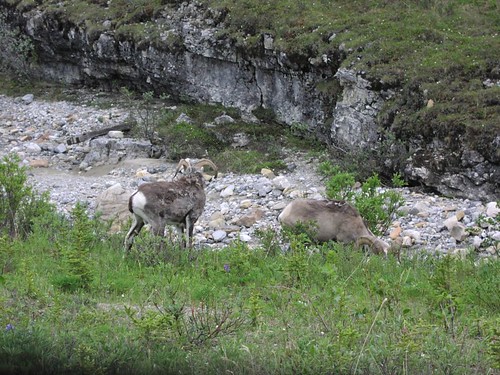
Stone sheep in northwest Alberta, Canada.
(*photo credit)
May 8, 2022 Shepherding and Pasturing among Wounded Sheep
The lamb who is at the throne will be their shepherd and will
lead them to springs of living water; and God will wipe
away all tears from their eyes. (Rev. 7:17)
We often imagine the persecuted to whom this passage in Revelation is directed as distant North Koreans and sufferers of other oppressive regimes -- but that is not the whole picture. We could speak of the suffering people closer at home: prisoners, home-bound, terminally ill, mistreated children, homeless, those not able to meet their bills or provide food, and the mentally ill. True enough, these believers are all part of that vast multitude of the followers of the Lamb. We each can add a choice name of those closer-to-home sufferers who await the blessedness of eternity. However, let's add another category -- WE the poor.
Yes, we are in this together, and must not opt out by denying our situation, excusing ourselves as too young or old, or too weak or strong. To participate in the enterprise is to accept the social nature of the consumer addiction sweeping our planet at this time. We either are swept up in the consumption culture or are silent as to its effects on our neighbors near and far, from North America and Europe through Asia and the far corners of the planet. Consumption of non-essential goods is pervasive and growing at an immense rate as more people seek a higher quality of life. Projections are that air conditioning will multiply forty-fold in this century. Hundreds of millions want part of the material pie, and feel they have a right to it as much as the affluent.
Christians are people called to service, and must understand not how much better we are than others but how we are among the impoverished in spirit awaiting the coming of the Lord. This togetherness is not some forced destitution, for all need proper shoes and means of transportation and communication. The solidarity is with those who desire to do something to save a planet moving rapidly to self-destruction through severe climate change that could do irreversible damage if not stopped now. Through global working together we can address this situation.
We are in this together and so our solidarity is not that of an elite or privileged few above the rabble. Let's not think we have prized information that we will spoon feed peons. We are socially deaf, if we allow the privileged to deprive groups of what is rightfully theirs. Social ills afflict us all and we suffer with our more destitute brothers and sisters through commission or omission. If we recognize our poverty, we will be fitting instruments to help change the world. As we move forward on a more serious note in our journey of faith let's realize that our sharing with others is a means of showing God's love for all.
Prayer for Mothers: Lord, as we celebrate Mother's Day, provide all of us with a touch of motherliness. You have given to all mothers the grace to show tenderness and love for their children over long-term childhood growth and beyond. We all have opportunities to learn from our mothers the grace of sharing with others through pure motherly devotion. Enflame us to encourage mothers to continue these selfless efforts; may we seek to grow in a devotion to your mother and mother of us all, the Virgin Mary.

Peach tree in full bloom.
(*photo credit)
May 9, 2022 Serving Others Is a Privilege
As we reflect on our celebration of Mother's Day, we recall the multitude of service given by each parent in the proper upbringing of their children; the great majority would regard their love-wrapped service as a privilege. We too need to see our service for others (a broader world of brothers and sisters) as an opportunity to exercise the privilege of living at this time and having the energy and faith to carry on in our vocation of special service. Our gifts of intelligence, culture, and material goods are all too often overlooked, both by us and others. Sometimes we stop and ask whether we earned these gifts; were they from God's gracious hand and something undeserved? - now they demand a responsible use.
Privileges do not come through nationality, color of skin, or transitory physical endowments; we are truly privileged in a spiritual way when we respond to the gift of service opportunities afforded us for the good of others. We look to the humility of Jesus, the ability and inclination to be down-to-earth. We are called in a unique way to serve, and this service means helping others who are in need. When we answer this awesome call, we are accepting a privilege of living here at this time and place.
Let's look out in the neighborhood and among the folks we know for examples of people who have accepted their responsibilities and attempt as best they can to use them properly. Quite often these are the overlooked parents who in simple way sacrifice much so their offspring will have a good quality of life. These have nurtured us and spent sleepless nights when we were sick and they never gave a complaint or showed a dash of selfishness. By giving all they had to their own, they accepted privilege in gratitude for the chance to do what had to be done. Some who care for others (teachers and bus drivers) are so selfless that they also serve in countless ways. They are unsung heroes and heroines; they deserve thanks for unsung service.
Every Christian is called to welcome opportunities to serve others, even while tempted to overlook the obvious and look beyond for potential drama. The special service opportunity before us is often so very simple that it stares us in the face. Let this reflection be a double challenge: pause and reflect on the opportunities of service that come right here and now; let's see them in their full dimensions though hidden from public view, misunderstood, unappreciated, and soon forgotten when done. God alone knows our selfless service and that should be sufficient.
Service comes better through experience, and it takes the encouragement of others to help each of us accept our full responsibilities. This goes for the youth, but also for each of us in adulthood who realize the need for improvement. We are learners and should pray to respect the privilege of ever deeper service.
Motherly Embrace: Lord God, you created the hug to be a sign of your love and mercy for us all. We do not see you distant, but up close; you are near when we are in need of affectionate attention during hard times. We affirm that you do not sit away from us peons on a majestic throne; rather, you are always near, especially for those who have a hard road ahead. Your tender hug invigorates the traveler. Teach us to hug another when they are in need, especially those struck by this ongoing pandemic.

Common Kentucky field sighting, yellow rocket, Barbarea vulgaris.
(*photo credit)
May 10, 2022 Using "Charity" as Power
Non-profit charitable institutions take note! Isn't all forms of charity worth pursuing and relishing? Two groups counter each other: one says private wealth could influence society; another says public wealth must determine policy. Perhaps we should look more deeply at charitable donations and their influence. We can hardly deny the influence of those who have billions to give and are open to suggestions by non-profit institutions with outstretched hands. However, Jesus gives us a corrective when it comes to pure charity. He and his disciples watched the poor widow giving of her basic means (in pennies) to the temple treasury; for Jesus, she was giving the most of anyone. Have you currently heard of honoring a widow for giving pennies (even when hard-earned)?
The use of charity as power is seldom mentioned, because many feel the charitable folks have a right to see that their money is used properly; shouldn't donors insist that certain strings be attached. Thus, money is given with controls attached by righteous "owner" donors. The position's strength is that the funds will be used in a responsible manner before they are wasted; its weakness is that the exercise of power in donation comes from excessive wealth that really does not "belong" to the donor in the first place. It's God's money, and democratic people must exercise such power to see that the Commons are properly furnished.
The additional weakness is the competition, for this charity makes aspiring parties keep to the expected donor's leash in order to compete for grants. Thus, a power is exercised beyond actual charity, and involves being rich and willing to deal with the begging party. The status quo is preserved all the more when the wealthy can exercise such power over begging institutions. In this globalized age when money matters are not easily transparent, accumulation of wealth and its mobility are a new phenomenon. Uncontrolled wealth of immense billions is utterly dangerous and is subject to being autocratically used. "Charity" is that instrument of power that stops conversation and never allows us to question motivations; some may even insist questioning is rash judgment.
Here we find great differences as to what is "charity."
Should we not challenge a system where charity becomes power? Let's tax the surplus so the temptation of power through immense "Charity" does not arise. An accumulation of small donations for some agreed purpose is a good use of charitable donations. The ability to accumulate and retain vast sums of money and exercise power through political, economic, or social initiatives weakens the democratic power of the people. It is a blatant example of the Divine Right of the wealthy to set and determine policy, in order to continue perpetuation of that wealth through inheritance and beyond the lifetime of the holder of wealth.
Flowers Prayer: Lord, in this month of May, you give us flowers to make us happy and raise our spirits when depressed, to beautify the lonely spots, to furnish color and fresh scent to the landscape, and to help us pause and reflect on all your creation. Flowers attract more than pollinators; they attract us when we need to pause, provided we are not distracted when driving past floral roadsides. Thanks for flowers of the fields and gardens, even when we realize they are temporary; their brief span makes them all the more precious to us. May their color and fragrance give you glory!

Smooth yellow violet, Viola pensylvanica.
(*photo credit)
May 11, 2022 Opting for Garden Variety with Its Benefits
"How to" create healthy garden variety has drawn our attention over time: choice of favorite produce, soil conditions, microclimate, space and placement limitations, solar radiation (sunlight) rates, crop rotation, and suggestions for interplanting to save space. The list is formidable and challenging, but does not necessarily focus on the reason for choosing variety. In fact, the "why" needs to be expanded with some benefits:
* Educating potential -- Variety gives growers, neighboring observers, and produce sharers many new experiences in homegrown produce. Variety offers opportunities to learn how everything from eggplants to peanuts grow and ought to be managed;
* Changing landscape -- Variety adds beauty in contrast to the monotony of a single crop. Thus, the flowering and stages of growth of different plants stand next to each other (variety should include flowers) and allow for an ever-changing seasonal landscape;
* Practicing good ecology -- Variety does not allow pests to take over and, when well located, some flowers or herbs will actually repel those pests. Companion plants offer protection;
* Making life interesting -- Variety is the spice of life. Since vegetable cropping may satisfy a desire for growing a specific favorite, it also affords an opportunity to grow surprisingly different things with new tastes and more creative cuisine;
* Discovering new choices -- The only way to find out what grows best in your own microclimate is to test varieties of greens or tomatoes or potatoes and to record results. Make gardening an ongoing research project;
* Saving money -- New varieties allow us to improve the produce obtained and curb food costs. Discover that a dozen types of leafy greens can be raised through a growing season and the savings on salad ingredients alone are sizeable;
* Ensuring against weather variations -- In years of excessive rain or drought some crops do better than others. A garden with variety allows every year to be good for one or other item and ensures against disaster;
* Talking point -- Variety gives us the reason for exchanging information with other gardeners who have their own experiences and yet want to expand their growing horizons as well. We become more experienced through variety and learn to obtain green thumbs;
* Admiring creation -- Variety teaches us the need to see the treasure of the multitude of differences and how much we should protect and preserve all types of species; and
* Occupying gardening time -- Fewer species grown mean we do not spend as much time in gardening. However, this last reason may not be regarded as beneficial with those with limited time to spend gardening, but for enthusiasts it is a good reason.
Spring Hiking Prayer: Lord Creating God, in the glory of this ideal season, make us more aware of surrounding created things: awesome wildlife, multi-colored flowers, budding trees, twittering birds, blue skies, and others who we might meet and greet. May we hikers, real or virtual, breathe deeply the fresh air and open ourselves to the sunlight along with the sights, sounds and smells of the season. We pause and thank you once more for new life abounding all about us.

Spring streamside view.
(*photo credit)
May 12, 2022 Debunking America's State Religion
"The first major change must be the disestablishment of our
National religion: commercialism." The Contrasumers: A
Citizen's Guide to Resource Conservation, (Praeger, 1974).
The state religion could be defined in the above words, or as "the consumer culture" or "unregulated financial Capitalism." We may quibble about the exact title or over whether the unregulated aspects are inherent to a global capitalism that must be replaced, or something that tweaking this system will adjust. Most Americans who see the consumer culture or capitalism as a state religion (without admitting it) would opt for the latter. For them, capitalism is opposed to communism and they tend to forget that the Chinese Communist Party leaders (some billionaires) are foremost proponents of global capitalism and strong advocates of the worldwide consumer culture.
To dethrone capitalism is a revolutionary challenge shared by the unemployed and disgruntled, a few radicals and perhaps many unsuspected but silent folks. We can make common cause with them, provided they desire a non-violent revolution; we all must see that fair taxes are a way for bringing equality to our wounded Earth. Unfortunately, the propaganda by the wealthy calls for no new taxes, especially since they pay so little. Some of a more evangelistic ilk blend their capitalism into their Christianity, as though it is all one. Part of the problem with many churchgoers is that they overlook moral demands, and become faithful adherents of capitalism that has in the past opposed atheistic Communism.
As described in Reclaiming the Commons, proponents of a capitalism blended with religious piety accept the motto "In God We Trust," but the god trusted can become the Dollar. For them, those fated to handle this sacred trust are investors and hedge-fund operators; their financial centers are their churches, the daily stock market readings are prayers, their agreeable economists are theologians, their congregation is the citizenry, and their participation based on their willingness to consume an ever-widening range of luxury products. To question this stance is to be regarded as heretical and runs the risk of being thrown outside the pale, since it is only adherents who have proper credit ratings and are qualified to worship the great god money.
Our inability to make a change in this dysfunctional mindset baffles us and, unless we are people of ever deepening faith, we will give up and say it is useless. The call is for an ever-growing awareness of what is befalling our country and world -- the reign of a materialistic culture. We must collaborate with all people of good will as we prepare for the coming of a New Heaven and New Earth. We can overcome selfishness by sharing resources with all who are in need of essentials.
Prayer for a Steady Nerve: O God, assist us to know ourselves for who we are. Deflate our false egos. Inflate that part of each of us that yearns to do good things, deflating that which is so prone to false egotism. Allow us to choose roads least travelled by crowds, but still beckon to be explored and mapped. Let us champion public interest science, with an openness to essential issues as they surface; make us aware that this is a field devoid of honor, income, publicity, and influence. Make us satisfied with choosing this less-trod road, and mobilize our talent, energy, and enthusiasm to improving the common good.

Early bud growth of the shagbark hickory, Carya ovata.
(*photo credit)
May 13, 2022 Conserving Water for Growing Food in Dry Times
On occasion we find the growing year a water-short one, that deserves our conservation efforts. We need the rains in order for basic crops to come to fruition and help feed a hungry world. The dry condition may affect our own backyard garden and the many lawns all about us; they may also affect immense expanses of farmland through the Midwest, where corn and soybeans thrive. At the start of the growing season, we can always pray for rain.
When dry conditions occur, one immediately thinks of conservation and stop washing cars and filling of swimming pools. Yes, individuals can do much to conserve water. But farmers need much more water than what our rainwater barrels and cisterns can furnish. We consider Arizona cotton farmers who have to stop when Lake Mead continues to fall, and is expected to support millions of urban Americans and Mexicans. Some farm crops are needed for food essentials, and so priorities are necessary.
Live plant mulching has been known for centuries, but not something that corn and soybean farmers with their heavy equipment and standard plowing methods consider. Perhaps no one has the time or resources to spread mulch materials between rows of large fields of corn? Last summer, I covered my small patch of cucumbers with Remay to retain moisture and reduce soil temperature, and it was partly successful. However, small plot gardening is not large-scale farming. Furthermore, interplanting with early producing vegetables covers the garden space with green mulch while taller vine or stalk crops are gradually coming to full foliage.
Conservation tillage. David Brant, a farmer with 1,150 acres in Carroll County, Ohio used a no-till method of protection by an eight-species, cover-crop blend including alternating rows with radishes and Austrian winter peas. The ground temperature of his farm was about 80-90 degrees F in contrast to tilled fields of neighbors reaching 130 degrees. Besides lower soil temperatures, the cover crops helped retain moisture level. The result was corn averages of 165 bushels per acre, in contrast to neighbors using conventional methods and getting 100 bushels per acre.
Ecological Farming. Less harsh methods reduce bare soil in corn or soybean fields. No-till methods using living mulch are certainly better than heavy use of herbicides; less fuel is expended; interplanting legumes reduces need for commercial nitrogen fertilizer application and thus results in less runoff of fertilizers and water contamination. The goal is to mimic mother nature more closely. In fact, the corn/beans/squash "three sisters" method of Great Plains Native American agriculture (before European farmers) was closer to these innovative no-till methods than to the traditional settlers' methods.
Our Lady of Fatima: Our Lady, you came to children in Portugal a century ago; you gave them a simple message for the faithful to offer prayers for peace in a world that was engaged in warfare. This site of your appearance has become famous for millions of pilgrims. Over the years, through your request for prayers, Russia shed its Communist yoke. Furthermore, healings both physical and spiritual have occurred at Fatima. May you intercede for us that nations turn weapons into pruning hooks.
RUSSIA vs. UKRAINE; CHRISTIAN vs. CHRISTIAN
War as conflict among any people is horrible enough, but for committed Christians a war between those of the same basic faith is unimaginable. Some may find a lame excuse that the commitment of the protagonists in Russia and the Ukraine have only cultural similarities, but when it comes to nations where one side now states it is “Christian” (Russia) and another where many of the population say the same, one cannot but step back and ask “Is this the 21st century?” Granted, the Middle Ages had such struggles, but among fighting people who often overlooked their similarities in creed; then the 16th and 17th centuries saw the violent Protestant/Catholic clashes, where each side declared their antagonists to be anti-Christian. Further, in fast forwarding to the 20th century, we recall the famous Christmas event in the First World War, when the guns fell silent and the opposing “Christian” armies sang carols and exchanged gifts. The military hierarchy of both sides were so alarmed that it was never allowed to happen again during the next three years of war.
Russians and Ukrainians are fellow Slavs and both honor their foundations in Orthodox Christianity to the same leaders and places (especially Kviv or Kiev). The story of the Orthodox sub-branch is considerably more complex over the centuries and more so in the last decade, when the Russian Orthodox favor the Patriarch Kirill of Moscow, rather than Bartholomew, Archbishop of Constantinople, as ecumenical patriarch (now recognized by many Ukrainian Orthodox and mentioned in their official liturgy); Russians mention the Moscow orthodox leader and want their Ukrainian confreres to do the same. This split is not often understood and the antagonism has reached a critical point in festering differences. Putin leads by stressing differences and wants Ukrainians back under the Russian fold. One must admit that besides the Orthodox, there are a number of Eastern Rite Catholic and other Christians, as well as Jews and others in the Ukraine.
Let’s return to the basic theme: it is not “Christian” that brothers and sisters of the same faith fight each other. When we look deeper at the horror of mass murder in the Kiev suburbs by the withdrawing Russians a month or so ago, we are struck in the heart at what people (who do not want to call it a “war”) will do to fellow Christians beyond the dictates of the Geneva Convention. War crimes of Christians against Christians. These are actions that the previous interfaith fights mentioned above would never have dreamed of doing, for the acts are barbaric to say the least.
Truly, the engagements of the last few months are profoundly depressing because the atrocities will have to be answered by leaders who, if allowed to remain in power, are the very ones which will have to collaborate with each other to curb climate change. Russia is a key player, not a minor actor. This raises a serious question: can the collaboration, that we have described over and over as necessary for Earthhealing, be achieved without a major change of leadership in Russia? One cannot possibly expect someone accused of criminal action to be party to renewing the economy of the world. It is time to pray sincerely for regime change and back our leaders who see the necessity.

Jacob's ladder, Polemonium reptans.
(*photo credit)
May 14, 2022 Producing Food on Land for Essential Needs
The one who wrongly holds that every human right is secondary to his profit must now give way to the advocate of human welfare, who rightly maintains that every man holds his property subject to the general right of the community to regulate its use to whatever degree the public welfare may require it. Theodore Roosevelt
Without sufficient cropland, much of the world's one billion people who live in food-insecure regions face major hunger problems. In this decade, we experience continued food insecurity by hundreds of millions of people. The U.S. Department of Agriculture (USDA) Food Security Assessment states that around one billion food insecure people exist in about 70 lower income countries. Food security and productive land go hand-in-hand. The terror of hunger is an abomination in an age of plenty and, with enormous food wastes (enough to feed a major portion of the world's hungry), the wrong is magnified. Food shortages resulting from increased biofuel production or natural disasters contribute to the disturbing pattern of continued food insecurity.
Scarcity of cropland grows with population. Most staples are grown on productive land that is limited and being taken out of production through commercial development and recreational purposes. While some dire emergencies can be met by shipments of food from surplus nations, a more sustainable approach is to produce food at the local point of consumption. Subsidies in richer nations go to large agricultural enterprises that unfairly compete with small-scale farming operations.
Farmland price inflation continues and soon is beyond the reach of most aspiring farmers. Sometimes surviving family members cannot afford estate taxes. Economic incentives are often lacking, thus leading to further sub-division of small family farms or the forced migration to urban areas. In contrast, large landholders occupy land for their own extravagant purposes -- lawns, hunting preserves, buffer zones, scenic views. Redistribution becomes a major issue -- and a growing necessity.
Large estates often occupy potential farmlands, but remain in an ornamental condition, often to the benefit of outside wealthy interests -- and to the detriment of poorer local inhabitants. All the while, potential small-scale producers cannot find territory on which to grow their own crops. If more attention were paid to farmers growing produce to feed their locality, part of the current global hunger problem could be alleviated. However, estate redistribution is difficult in part because new farmers need initial capital and are often inexperienced in homesteading practices. Targeting underutilized, fallow or decorative lands for food production could provide one-quarter of America's food supply; these could result with reintroduction of W.W.II "victory gardens."
Saint Matthias, Apostle: You were chosen. St. Matthias, as replacement for Judas who betrayed the Lord. You accepted your new role with full-hearted enthusiasm and with humility and devotion. You went forth to other parts of the world to bring the Good News to those in need. Help us who are chosen so late in the age of the Church to spread the Good News. Intercede for us so that we might have the apostolic spirit to serve others -- and to do this with our Redeemer's love and mercy.
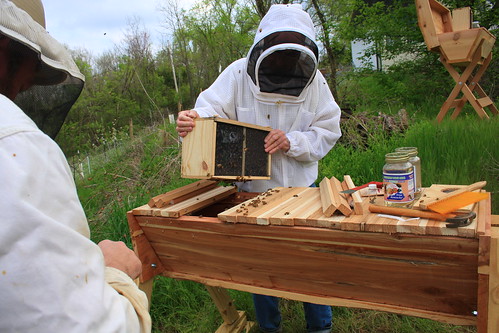
Installing honeybees into Kenyan top bar hives.
(*photo credit)
May 15, 2022 Earth Healing as a Form of Glorification
"Now" has the son of Man been glorified, and in
him God has been glorified. (John 13:31)
Jesuits have a motto Ad Majorem Dei Gloriam (To the Greater Glory of God). How we can give glory to God is worth deeper reflection. The words of glorification by Jesus (John 13) were spoken at the Last Supper right after Judas departed on his betrayal mission. The entirety of those succeeding days was included in this glorification that is Jesus' suffering, death and resurrection, all taken as one historic event. In some way that event, monumental for all believers, also gives a place of glory to Earth on which the happening occurs. Given all the aeons of time and the immense multitude of space, at this concrete location in Jerusalem in Israel redemption occurred. Christ offered himself totally for the salvation of the world -- and God is glorified in the fullness of this offering.
Easter glory is part of our deeper reflection during this joyful season. We rise with Christ so that we can be Easter people. We are called to enter into the mystery of the risen Lord that extends in space and time; WE are involved in this event in the HERE and NOW. All of this has been spoken about at length in other reflections and yet the depth of the mystery of our involvement must be retold because of its supreme importance. Our physical Earth is threatened, and we are the ones as healers who are the hands and feet of the risen Lord. In Easter we see Christ's glory and, in this insight, we begin to discover the potential of giving glory through our actions.
Faith is needed to believe that glorification is possible through healing. In 1967, my ordination prayer card read, "Faith is seeing the brilliant countenance of Christ looking up at us from every creature." (The card is copyrighted by Abbey Press). At times our sight becomes blinded and glory goes unrecognized. At this critical point in history, we pray that scales fall from our eyes and we see the suffering Christ, an ongoing Calvary event. Through renewal, we make resurrection possible for Earth herself. If she (Earth) can be renewed, we give witness to the reality of resurrection in our participation in the work of Christ.
The glory we receive in believing in the Lord is the glory we share with all the members of the Body of Christ. What we do in glorification (making glory) shows forth the Creator, for we are empowered through faith to enter into the Easter mystery, and this means a monumental task is before us in the spirit of the Christ who suffered, died and rose for us. Life come again! We cannot tarry nor be like hesitant in the urgent work ahead; we are called to enhance the glorification, and we do so with the faith that we go to Calvary with Jesus and rise with him from the tomb.
Grace to Love One Another: At the Last Supper, Lord Jesus you said: My children, I will be with you only a little while longer. I give you a new commandment: love one another. As I have loved you, so you should love one another. This is how all will know that you are my disciples, if you have love for one another. Lord, the message sounds so simple, but it contains a vast demand on us regarding the intensity of love for neighbor; it is to be with the degree of love that you give us. That challenge is a lifetime work for us. Give us grace to extend love to others.

Pollinator visits spring beauty, Claytonia virginica.
(*photo credit)
May 16, 2022 Making the Peace Dividend a Golden Opportunity
This is Wear Purple for Peace Day. Different colors have special meaning (green, pink, yellow, rainbow), but peacemaking certainly deserves its special color. With the current peacetime dividend, a feedback loop of national and global benefits could result. Peace-loving people pray and work for the beginning of a "contagion" of benefits that will make peace more than a promise; it can become a reality in a strife-prone world.
When this reflection was drafted, a major commitment was being made to settle the terrible Syrian Civil War and other global conflicts by diplomacy, with the possibility of success. Looming in the background was a Chinese/Japanese dispute over some uninhabited rocky islands that both countries claimed within the Okinawa Island chain. If open warfare is halted or forestalled, then peace dividends can start to work. This consists of saving money that would have gone for military hardware and personnel; these can be diverted to health, educational and infrastructural benefits that are most needed today.
Is the peace dividend more than wishful thinking? Could the combined military budgets of the world be reduced and savings accrue through making rapid-deployment strike forces a reality? Couldn't these corps be multi-national in composition and trained by experienced global agencies? Couldn't sophisticated military hardware be reduced dramatically or eliminated? Doesn't the mere possibility of economic benefits drive the peace forces forward?
Is it more than economic savings? With less weaponry, all nations would have less temptation to engage in a conflict with neighbors and others. Militarism as a solution to conflicts takes a back seat to diplomacy, to the betterment of all parties by peaceful means; we need an entirely new mindset to settle disputes. Powerful nationalistic competition, such as existed a century ago in Europe prior to World War I's inception, must be avoided.
Does a dividend give expanded opportunities? When peaceful opportunities afford themselves, all democratically participating citizens are called to act. We have to present citizen pressure on legislators to take on the spirit of peace, not to be coerced to support belligerent forces capable of conquering another. In fact, part of the citizen efforts must be dangling peace dividends before politicians, with hopes that they might see dividends as political and economic opportunities. Think of ways saved money can be better spent: debt reduction, improved infrastructure development. new work opportunities for the un- and underemployed, and installment of renewable energy applications.
Vineyard Prayer: Lord Sacred Vine, let us who are the branches be ever more connected to you. We realize, like good vinegrowers, that you allow us to be pruned in winter, so as to be willing to be properly disposed to your graces; we are now pruned in summertime to bear even greater fruit. Keep us connected to you at all times and may we avoid the misdeeds that can drive us apart. You are truly the vine and we are the branches.

Following a wildflower trail.
(*photo credit)
May 17, 2022 Being Aware of Authentic Charitable Need
In our locality a number of people come begging for utility payments and food, especially towards the end of each month. In some cases they genuinely need assistance; in others they are taking advantage of the generosity of individuals who tend to listen and help the needy. Making the distinctions between those in need and others is often quite difficult. No doubt many recipients appreciate the generosity of our parishes and these are generally material gifts, ranging from food to clothes and household supplies. Certainly, givers feel good in giving; however, what does charity do for the poor of our region?
Charity can be an exercise of power. A cynic will say that a spirit of charitable giving comes from an inflated sense of power, which allows us to give from a surplus that should not have been there in the first place. Charity certainly comes from being aware that others are in basic need. But does charity as an exercise of power only prolong the agony of the poor? In justice, all have a right to essential resources first -- and our government must guarantee that right. Now we move to a different mindset -- not that the private sector picks up the pieces of our region's poor, but that it becomes the focus of improvement of this incredibly beautiful region's ability to share natural endowments. Should charity as a tool give way to finding social improvements, such as employment to assist in earning power, not the power of giving to the needy?
Yes, Churches pick up the slack, giving out charity to beggars, some of whom should not qualify. But this is not more than a temporary answer. Certainly when tornados occur, the outpouring from non-affected parts of our Commonwealth and beyond is overwhelming -- and thank God people care for those in extreme need in such a spontaneous fashion. However, the problem with charity is that it is good in acute cases and bad in chronic ones, that is, for answering long-term problems such as persistent poverty. Residents can suddenly become charity cases through illness, and I hope we are sensitive to such events.
Quite often churches act as friends to the wealthy and encourage them to give from their surplus, which they never should have had in the first place. The two-class system of have and have-nots works well if the haves are prodded to give and the have-nots are prodded to be patient and await their turn. How about the inverse? What about the haves being prodded to accept heavier taxes with revenues needed to create jobs in the poor region? What about the have-nots being prodded to rebel and call for the right to a livelihood? Well and good, except governmental agencies can waste money, and some poor are lazy. Maybe St. Paul was right, if you don't work you don't eat. Read Robert D. Lupton, Toxic Charity: How Churches and Charities Hurt Those They Help (And How to Reverse it), Harper One (2011). The world is not perfect.
Bridges Prayer: Holy Spirit, you direct us to where we can span the torrents of life and remain connected to the divine grace. You are the maker of bridges, the true pontifax, the inspirer of the Pope and leaders in the Church, as well as parents and those who accept the role of spiritual servants. We all need to build bridges, whether majestic or simple, which bring us across and keep us together in trying times. Never allow these instruments of unity to be damaged or destroyed, for they are so needed today.
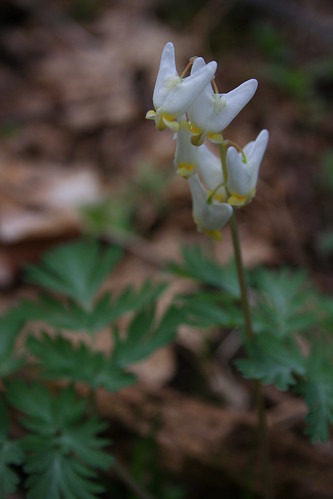
Spring wildflowers on parade. Dutchmans breeches, Dicentra cucullaria.
(*photo credit)
May 18, 2022 Finding Whether Enclosing the Commons Continues Today
During the 16th and 17th centuries, and well into the Napoleonic War period, the common lands of England's rural villages were progressively enclosed; those who did this said they wanted to "protect" land from tragic overuse of the Commons by the "greedy" locals. In the past, local communities self-regulated their common resources against overuse by such greedy folks. However, ambitious property holders with governmental connections saw a chance to regulate by sole "stewardship," and so enclosed the Commons for their own private use. This exploitation of common lands, from the discovery of America through progressive colonization, continues today by multinational takeovers of private African farmlands and Amazon deforestation projects.
Land is not the only problem area. When the Commons of water is privatized, common resources are diminished. When air is polluted by a major fossil fuel power plant, the common resources that belong to all are "enclosed" by a few. Some would cite the benefits of a multinational cultivating of former lands held by small farmers; they claim that air or water resources are for the taking, and so the "use" of these resources is a benefit to some of what was "unproductive" in the natural state -- and in the long term would benefit everyone through a trickle down of benefits. But all this is creating a false myth of massive privatization.
In Reclaiming the Commons, we extend the definition of Commons to include more than land, water, and air through enclosure or appropriation of a res nullius. We take joint action to safeguard these rights of all to the fruit of the broader Commons. We can talk about common cultural and historical places and practices; these are worthy of a global effort at preservation, for respecting such places enhances the whole world. We consider that if the Commons is meant for all, then human health benefits need to be extended to the whole world. We know that enclosure extends also to the intellectual Commons from James Boyle and his lucid book, The Public Domain; he regards what is happening in copyright, patents, and other practices as the Second Great Enclosure.
Protecting and enhancing the "Common Good" as agents of global collaboration is becoming more imperative with solving the problem of climate change. Extending Commons to silent space is not really too much of a stretch, for otherwise, without compromise between silent seekers and soundmakers, silent space and time will be lost. A final area of Commons is financial wealth; this resource belongs primarily for essentials of all and only secondarily as a luxury for the privileged few. The Commons of space for exercising human freedom includes physical movement from place to place for better opportunities; there are many aspects to the Commons, and we are called to be sensitive to their protection.
Grace for Confidence: Jesus, you constantly call us to an ever-deeper degree of faith. You say we could move mountains and place them in the sea -- if we have faith. But we need to move more than physical mountains; we must erase the barriers of social injustice that divide our people -- truly concerns to be moved into the ocean of your love. Help me with the gift of faith to truly believe that we can be of service. Help us to glory in our faith.
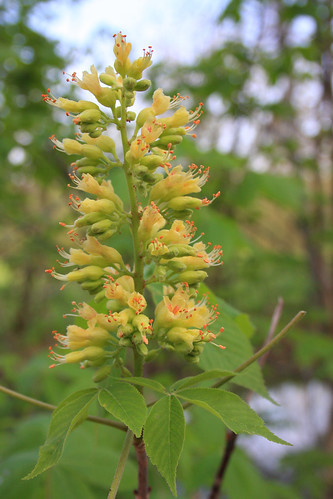
Flowers of the Ohio buckeye tree (Aesculus glabra).
(*photo credit)
May 19, 2022 Introducing a Climate-Changing Pollutant: Soot
One air pollutant was known from the start of the industrial revolution; it was worrisome long before the word "environment" was coined. No one liked soot, especially those in a factory town who had to hang their washed clothes outdoors. They joined the millions in rural villages who use an inefficient cooking stove in an enclosed hut. Soot is a problem both in- and outdoors. Researchers supported by the International Global Atmospheric Chemistry Project have found that brief coatings of soot or black carbon not only absorbs sunlight (as expected), but is a powerful climate change agent. Carbon dioxide has a warming effect of 1.7 watts per square meter of Earth's surface and black carbon 1.1 (original estimates by the UN Environmental Programme (UNEP) were 0.3 to 0.6) watts per square meter.
Researchers for a number of years have sounded alarms about the blanketing of soot from the atmosphere on glacier surfaces and other snow- and ice-covered surfaces in many parts of the world. The Arctic region is an area of deepest concern. The soot settles on the surface and acts like the dark object we observe in winter melting faster on the sidewalk than the snowy surface. Now extend this to objects on the surface of a glacier or on the entire Arctic region. Higher altitudes are more susceptible, and regional precipitation patterns are changing -- all because of environmental pollution causing shiny surfaces to become soot-covered.
Soot is already known to be a major health hazard; we have spoken several times about indoor air pollution problems and the hundreds of millions in lower income countries who are affected. The UNEP has estimated that, if black carbon emissions were controlled, some 2.4 million lives could be saved annually. Thus, there is a twofold reason for curbing this worrisome air pollutant, which only remains in the air less than two months and not for years. It is certainly worrisome, but it is also quite unhealthy.
Removal of soot is not as major a problem as reducing carbon dioxide levels, for some 70% of the emissions in Europe and North America come from diesel engines, which could be controlled with relative ease. The indoor soot generation in hundreds of millions of poor nations' residences is more difficult to control than that of vehicular emissions; the problem could be solved by widespread introduction of solar ovens or more efficient cooking stoves. However, making these available in sufficient numbers is more difficult than might be expected. And this would demand that many households would have to change the cooking locations. Paying close attention to removal of soot generation and cleaning the air of this climate change generator certainly would buy time needed to tackle the carbon dioxide problems.
Prayer at Home: Thank you, Lord, for instilling in us such caring devotion and love of homestead and local community. Your Son wept over Jerusalem, so threatened with destruction. May we appreciate that our forebearers worked and strived to make this neighborhood a place of family comfort. Guide us on our spiritual journey, and let us learn much from our mutual experiences. Our hope is to live fully and look in hope to an eternal homeland.
PROFOUND CHANGES ARE NECESSARY
We see the need for global change in order to have a renewable energy economy. With the invasion of Ukraine by Russia in late February, an already painstaking effort by many nations just took on a far more difficult challenge. A global leader of a country that is key to curbing climate change has moved from leadership role to a virtually insane militant, by attacking a peaceful democratic nation and murdering and raping the occupied citizen population; this constitutes a war crime. What has happened to vital collaboration between all nations? The essential community of nations has been shattered and we also ask where China (a major energy player) stands as a ‘neutral party.’
One alternative is to go it alone among democratic nations and hope that their changes in fossil fuel consumption and the growth of renewables will suffice; but can these reduce carbon dioxide to levels that will not permit global warming (about the 1.5 degree Celsius needed to prevent catastrophe)? When sanctioned, Russia is expected to come to its senses. Both China and Russia as major energy producers and users cannot be omitted, but how can Russia, under current notorious leadership, cooperate?
Realism says that the other alternative is “Regime Change;” this calls for the Russian people to take matters into their own hands and overthrow the Putin crowd. Certainly, this has been voiced and is not just wishful thinking by the president of the U.S. -- along with bipartisan members of both houses of Congress. The profound change to a global renewable energy economy is difficult enough and now we are proposing that a double change must occur, all in the next decade or so. While such a citizen change does not seem practical at this time, our hope lies in the effects of the sanctions on Russia. Dire financial difficulties could change the situation. Part of the Russian citizen dilemma is that most live in a “news blackout” and do not know what is going on. They may start to suffer financially, but do they know the causes of the sanctions that are the root of their deteriorating condition?
Time is critical. Leading a citizen’s mass to a point of change, both nationally and over a longer term globally, may be asking more than this highly suppressed people can endure. Recognized democratic opposition leaders are imprisoned or poisoned; protestors have been beaten down and arrested by the thousands. The use of the term “war” is forbidden, and independent news outlets have been silenced or driven from the country. Perhaps the last best hope at this time is through a “cold call” program that has been undertaken by patriotic Russians living outside the country in Poland, Romania and Baltic nations. If this citizen action would become strong enough, it could spread the word that change is needed to large numbers of propagandized citizens.
The need for profound change in Russia is imperative. This is self-evident from all authentic information from Eastern Europe. Let us pray that it comes soon and will bring peace to Ukraine and democratic leadership to Russia – and curbing to climate change.
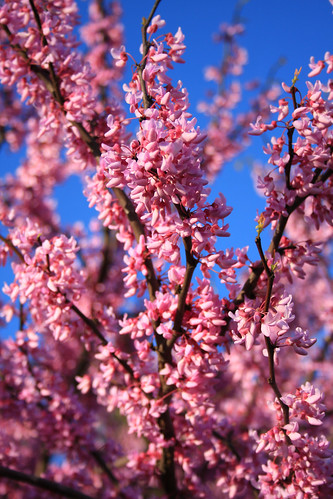
A sea of color. Eastern redbud, Cercis canadensis.
(*photo credit)
May 20, 2022 Recalling the Benefits of the Bicycle
On Bike to Work Day we could well afford to list the many benefits that increased bicycle use will give. In earlier and more energetic years, I biked to work across Washington, DC. Over time, more benefits accrued, even when my actual biking declined:
* Convenience: Bikes enable the person to cover relatively long distances in a reasonable amount of time. If skilled, the biker can easily move through heavy traffic provided the biker and all approaching car drivers are alert enough. Bikes are easy to park, take up little space, and can even be carried into some office or residential space for protection.
* Non-renewable energy: If we omit human energy (and that comes mostly from renewable food supplies), the fuel for autos and buses is unneeded for riding a human-powered bike.
* Non-polluting vehicle: Cars and internal combustion traffic that are so prevalent in this country and among emerging economies cause air pollution. Chinese cities, such as Beijing, are moving rapidly from a bike economy to an auto one, with the consequences of choking pollution for pedestrians; Asian cars are said to burn fuel with larger amounts of sulfur pollutants than do European and American ones.
* Physical Exercise opportunity: Biking is a wonderful sport for it keeps bikers trim with access to fresh air and full-spectrum sunlight, the keys to a robust body. The opportunity for exercise can prove most welcome to busy people, who would otherwise be driving or sitting in a bus or subway.
* Less threatening than other vehicles. Someone could get run over by a bike, but few harmed seriously or killed as happens so often when hit by an auto. With care and caution, bikers and walkers can co-exist in the same constrained space or trails with special marked paths and lights.
* Lower price: Recall that bike maintenance is much less than auto expenses, there's no needed auto insurance, and fuel costs are avoided unless you count a slightly higher food intake by bikers.
* Model of simple lifestyles: A bike expresses without words that the user is committed to a simpler lifestyle. Thus, biking speaks well in its own right.
No one denies that benefits come with risks and these include colliding with autos, bike theft, blowouts, and difficulties in riding bikes in rain or snow. A perfect world does not exist, and bikers know this. Competition between auto with its horsepower with the bike is no match -- and bikers know that as well.
Moonbeam Prayer: Holy Spirit, we step out on a clear night and observe our sister the moon. You have given us this Earth companion to teach us fidelity and rhythm in life. We appreciate the softness of moonbeams, for they challenge our aggressiveness and remind us to be peaceful in all our actions. Lead us to gaze at the moon often on pleasant nights throughout the year and especially at times of full moon.

Black rat snake, common Kentucky barn resident.
(*photo credit)
May 21, 2022 Discussing Ocean Problems and Solutions
You strode the sea, you marched across the ocean,
but your steps could not be seen. (Psalm 77:19)
Our ocean Commons covers two-thirds of the planet's surface. On Maritime Day we recall that vast expanse and the need for people to take this Commons seriously. In order to protect the unique beauty of coral reefs and value of ocean ecosystems, an effort must be made to declare them globally protected wilderness zones; portions of these fragile areas such as Australia's Great Barrier Reef ought to be off-limits to tourists and fishing operations. In place of tourist ventures, a substitute is to promote virtual tourism, that is, the coral reefs could be appreciated through photographs, videotapes, books, and articles.
Global commercial fishing extends beyond national coastal waters and extended reach of certain nations. Often annual limits are placed on various types of fish such as the North Atlantic cod, and then limits are exceeded through lack of strict enforcement; overfishing may lead to fisheries collapse and extinction. At current rates, the oceans will be overfished for many species in only a matter of years or decades. Global fishing regulations must be strict, with enforcement under UN supervision.
The International Whaling Commission has enforcement powers. In fact, no commercial whaling is supposedly permitted, only harvests for research purposes. Greenpeace has a ship that follows the Japanese whaling "research" fleet to the Antarctic Ocean areas because the environmental group is convinced that the whaling is "commerce" under the guise of research. In order to preserve various whale species, harvesting of all whales ought to be halted.
For several decades the U.S. has blocked an effective "Law of the Seas Treaty," that would cover all oceanic resources, especially those on the ocean floor (e.g., mining of manganese). Controls of such mining should be administered through an international body under United Nations auspices. Expanded powers of UNCLOS could call for the regulation of the extraction of fish, petroleum, minerals, and natural and cultivated seaweed from the seas. The exploitative temptation by high technology is immense.
The ocean Commons should not be divided among competing countries who seek enclosure and control for nationalistic reasons. Rather, the oceans must remain open for the benefit of all, even landlocked nations; these seas should be subject to a uniform system of controls. International exploration licenses could be issued with the revenue going to global marine development, policing and monitoring agencies. As technologies allow for deeper oceanic extraction, the need grows for global regulations and global licenses. Otherwise, the more advanced technology agencies would enclose what belongs to all the people.
Organic Produce Prayer: Creating God, you made us fit and able to produce nutritious food for our tables. May we not be tempted to use harmful pesticides and other chemicals that can remain and harm those who consume the products of the soil. May we strive to remain natural in choice of fertilizers, pesticides and ways of producing healthy products for table and market. May we always be mindful of essential needs of others in this time of hunger. May our ways be sustainable as the world moves to the eight-billion population level -- a multitude of hungry mouths.
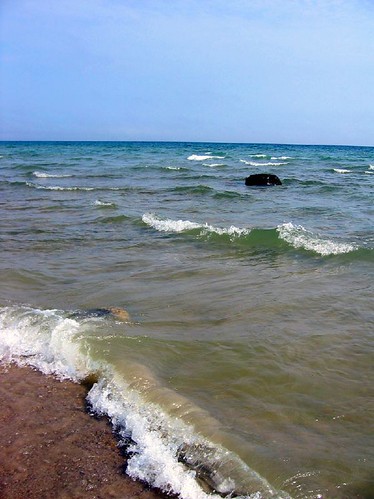
A spring day by the shore.
(*photo credit)
May 22, 2022 Establishing Peace in Times of Turmoil
A peace the world cannot give, this is my gift to you.
(John 14:27)
Peace is a gift from God, not of our making. As God's children, we come to recognize pure gifts for what they are, and peace is one of these. In turn, we receive, preserve, and help spread this gift as God's instruments of love and thanksgiving. Being aware of the gift, we make peace only within a humble recognition of our place as instruments of divine work; we are called to extend peace to a busy, mindless world in utter confusion. We are called as peacemakers to manifest the divine origin and destiny of peace -- for peacemaking is essential in establishing the Kingdom of God.
Establish interior peace. The challenge is all the greater, because this world becomes ever more unsettled with each passing day through mob and terrorist violence, financial mismanagement, and the threat of profound climate change. The contrast of what occurs external to ourselves and what goes on within us is of great importance, for balancing our interior lives begins the process of bringing peace to others. If we have interior peace, others are able to perceive it and become encouraged by it. However, we soon learn that peacemaking is not permanently cast, but requires constant prayer, sacramental life, and effort to persist in becoming and remaining effective peacemakers.
Establishing domestic peace. Amazingly, the greatest challenge to peace in this world is not that between nations, but that within our homes. All too often conflicts simmer in the home and we deny troubles, excuse ourselves, or escape to other haunts. God calls us to look within our most proximate community first, for Earthhealers are to establish peace within the domestic environment with times of silence and sound-making. But it is also the time to cultivate loving and peaceful relationships among neighbors with whom we live on a day-to-day basis. The devil is in the details. Again, as said in other reflections, place a picture of the Sacred Heart within the home as a way to launch domestic peacemaking.
Extending peace. By recognizing God as author of peace, we start to find our need for constant communication with the Almighty, for we cannot be peacemakers by acting alone. We cultivate the peace within when we approach the challenges without. We seek to bring peace to those neighbors in distress through prayer, encouragement when possible, and telling them of our concern for their situation. Being motivated with Christ's love allows us to extend "heart" to others. These grasp a helping hand, and so catch a glimpse of contagious love. Tell them you are praying for them.
Prayer to the Advocate: Holy Spirit, you come to direct the Church as Body and each of us as members. We are empowered to act through our Baptism/Confirmation. As the body of Christ we live in this troubled world, but we are not of this world -- yes, the distinction is hard for us to maintain. You give us the courage to settle problems as was done by the early Church leaders in extending open arms to Gentiles -- the most far-reaching ecclesial decision that has ever been made. We are now called to renew our Earth and save our planet. Teach us how to be true collaborators working in the harmony springing from the Trinity. Keep us from losing heart for the cooperative service work ahead.

Fruits from fencerow plantings.
(*photo credit)
May 23, 2022 Listing Edible Landscaping Benefits
We cannot eat the landscape, only the produce off of the land. However, the landscape is not meant to be a showcase of affluence, but land in practical use. Rendering land as food productive still presents a mentality from which many benefits flow:
1. Environmental awareness -- The landscape as presented to neighbors who pride themselves in manicured lawns of precise types of grasses, amount of mowing, and use of sizeable resources to equal or excel the neighbor, is affluent and wasteful showmanship. The opposite is productive land that proclaims green environment.
2. Food production -- We live in a world of land shortages needed to fill basic feed requirements. The global pool of good homegrown food is increased by an edible landscape. Many lawns are potentially fertile ground for productive crops.
3. Beautification challenge -- We know that beauty is in the eye of the beholder, but a varied landscape that changes through the growing seasons can be regarded as more beautiful than a monocultural lawn that looks like the next-door neighbors. Make landscape become beautiful in different ways and times.
4. Wildlife habitat -- Landscapes could have areas like untended fence-row growth that are habitats for small mammals. The edible landscape can offer feed for birds and land creatures.
5. Physical exercise space -- We need to observe the work of our hands; edible landscapes show-case this quite well. The joy of gardening is expanded to a larger landscape and may require more recreational time and physical endeavors.
6. Educational opportunity -- Gradually some neighbors will have the courage to ask how to improve their land. This makes the landscape part of a model neighborhood, where lawn care can be decreased by a willing community. Objections to edible landscapes may be voiced in educational moments -- and answered well.
7. Meditation place -- We do not have to get away in order to reflect and pray in sacred space. The edible landscape, when well cared for, is an inviting space to come and rest and pray.
8. Expand tasteful varieties -- Quite often people do not recall the taste of homegrown produce; by producing variety one allows taste buds to become more discriminating.
9. Spiritual promise -- We can continue the work of the creator through the re-creation of land sites. This gives us promise that our damaged Earth can be repaired and turned into a garden as originally intended. Edible landscape praises God.
Edible Greens Prayer: O Creator of all that is good, you offer to us many plants that are nutritious. Especially in springtime, we welcome the greens in our gardens and fields that are enriching: spinach, lettuce and brassicas. These are meals of our liking and veggies that are less costly in our world of ever-rising food prices. May others be aware of wholesome produce and imitate the traditional growers of salad ingredients. Lord, may our gardens thrive and be models for others to imitate.
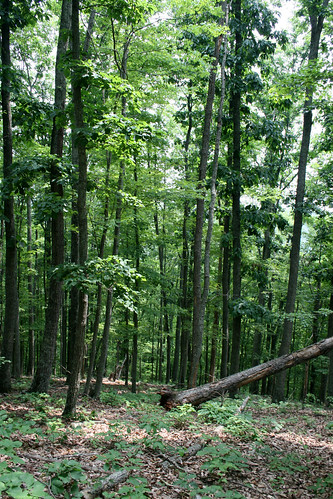
An afternoon stroll, Cumberland Gap National Historical Park.
(*photo credit)
May 24, 2022 Conversing with the Spiritually Unaffiliated
I spend Sunday in the cathedral of the forests. Anonymous
Challenges lie before us, if we are willing to become engaged. We are not puppets obeying blind forces of evolution, but people endowed with the spirit of freedom endowed by the Creator out of love and mercy. The vague hope of adherents in blind evolution is ultimately spiritless, and thus betrays the difficulties in working together with them to change the course of history.
A growing number of people (including acquaintances) pride themselves in abandoning church affiliation to join the spiritually unaffiliated (SUA). They may become aware that "spiritual" is of itself neutral and includes angels and devils, and so they are open to a devolving debate as to the relativity of good or evil. Personally, I prefer to discuss with the agnostic over the SUA, for there is a tinge of humility in the former, and all of us fit in that category in some of a multitude of issues. I am an agnostic about "water witching." However, let's look at SUA tenets:
* HERE. True human integrity accepts the imperfections and limitations of our brothers and sisters; as social beings, we share the results of these failures in our human family. In our age, a confessing Church that finds forgiveness utterly needs to refute the denial of imperfection. The failure of the SUA to publicly admit imperfection (e.g., deny human causation in mishaps) shows a pride that ultimately lacks basic social integrity.
* NOW. Active Christians ought to be revolutionary (lowly rise and those in high places come down -- Luke 2), but in a non-violent manner, for not all revolutions (e.g., 1990 velvet one) need to be violent. SUA people, who call for a new order, actually are revolutionary, but often lack the courage to admit it. And courage can grow through publicly professing one's faith.
* WE. Contrary to hopes of all, the unsustainable economy is gaining momentum in this world, leading to irreversible effects that will destroy the planet's vitality. We must join together in this critical task, and respect the areas of faith that empower people to break away from addictions and work for the Common Good. When SUA people associate religious institutions with corporate states and multinationals, their biases do a grave disservice to the hopes of collaborating together with professed believers.
* GOD. A failure to understand the social addictive nature of our culture increases the addiction for consumer products; also, this is a denial of the need for a Higher Power. An SUA liberalism that allows all to continue to do "their own thing" is dangerous, for no one can satisfy the insatiable appetite for consumer goods. Voluntary simplicity must be coupled with governmental controls.
Deer Prayer: Creator God, you gave us animals as companions, both to see your kindness and realize how they can teach us. You tell us to yearn for you as a deer yearns for fresh streams. These deer are now so plentiful that they take what they like from our gardens. Lest we forget, deer are a ready organic meat supply that takes no produced feed to thrive. Let us glory in their freedom to range lawns and woodlands; turn them from being pests to friends.
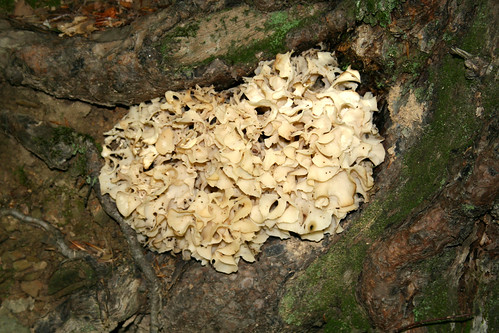
Sparassis - species unknown.
(*photo credit)
May 25, 2022 Housing Is a Global Need
Rapid urbanization in many countries has resulted in crowded conditions, which are inadequate for a good quality of life. Some rural areas also contain poor housing, and climate change is increasing the number suffering from such housing conditions. Along with food insecurity is coupled that of lodging for migrants, refugees and those unable to have a secure place to sleep at night.
A decade ago, heavy rainfall caused a populated hillside in La Paz, Bolivia, to collapse, destroying homes of several thousand people. Residents were angry because they had to build on steep, slip-prone hillsides with no planning, few streets, and little sewage and water facilities. In many parts of the world, lower-income people build their own residences on flood plains and where unsuitable land is all that is available. The reason a million Haitians were without housing during the severe earthquake a decade ago was lack of clear title to housing sites, a global problem to be sure, especially during these times of climate change and flooding at many urban building sites.
Scarcity and extravagance exist side-by-side. A Los Angeles suburb challenges construction of a mega-mansion of 80,000 square feet. Each year, over seven million mostly urban Americans pay over half their income for housing. The Great Recession indicated connections between housing and credit crises, with millions of residences going "under water" (mortgages higher than market value). While there are now somewhat lower interest rates and mortgages, still the burden of paying for housing is a major concern among lower-income Americans. More public housing is one answer, as is regulated finances and halting hidden red-lining of partly or totally racial neighborhoods.
Unproductive public lands comprise almost one-quarter of the U.S. surface area. Mountains and deserts and wetlands are part, but are often "productive" wildlife habitats. However, urban-abandoned lands in depopulated cities can be made productive. Hard-hit Detroit now has over a thousand urban gardens (some up to an acre in size), where vacant residence plots have been turned into urban homesteading. Vacant military bases, portions of airfields, prison grounds, highway right-of-ways, cemeteries, educational, health and technical institutions and other facilities contain potentially good residences. In times of financial difficulties, privatizing such areas becomes a temptation -- sell or lease parks, prisons and municipal water works -- even highways.
The government must take an active role in both regulating housing practices and in building additional public housing, especially in areas of former abandonment of land. Everyone deserves adequate housing to raise their families properly.
Saint Bede the Venerable: Holy Spirit, you guided St. Bede in the use of his talents in writing history and theology to great effectiveness. He spent much time teaching and preaching at a period of great conflict, both in England and Western Europe. Those who followed him have profited much from his efforts. Lord, grant grace to those of our writers today who wish to spread the Good News. May we all gain much from the lives of such people as St. Bede in presenting our faith to others.
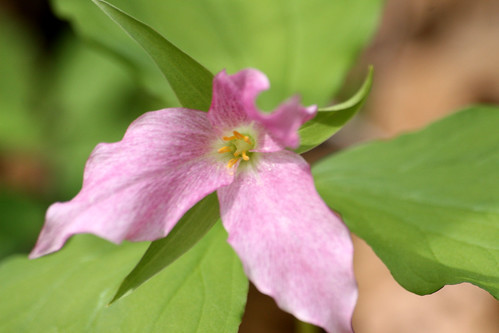
Large flowered trillium, Trillium grandiflorum, in pink.
(*photo credit)
May 26, 2022 Taking Responsibility to Save Our Earth
Why are you men from Galilee standing here
looking into the sky? (Acts 1:11)
In some parishes the feast of the Ascension is shifted to the following Sunday. However, this has been the traditional day on Thursday. When residing at St. Peter Church near the U.S. House of Representatives in 1974, I celebrated the noon Mass on the feast of the Ascension. On entering for the Mass, I noted the presence of the Speaker of the House and the Chairman of the Ways and Means Committee, both present to fulfill their obligation. We had a serious national issue in which all were hesitant at that time. So I struck a strong note on "why are we looking up to heaven?" and "Let's be on with the task at hand!" Were they listening? They took remarkable actions a little later.
Strange but this is perhaps the only time I've mentioned this incident of a half century ago, mainly because I regarded it afterwards as too blatant a political act to have been executed within a sacred homily. Today, I celebrate the Liturgy in a far more humble church in Appalachia among a quite smaller congregation in a deeply "red" state, and yet the current political/economic/ social event (climate change) demands that we break silence. However, the global issue before us is more serious than in 1974. Why are we looking up to the sky when we must be on with the work of being other christs in saving our wounded Earth?
Amazingly, some who convince themselves that the Church has no business in economics would swallow the merchants of doubt stalling tactic of saying scientific evidence is not yet convincing (translated, give us another decade of making billions in profits off of fossil fuel consumption). This all adds up to a lame excuse to become neutral and withdraw from the battle until the winning side is evident. The responsibility of the Christian must be on the side of theological virtues: temperance in use of fuels; prudence in taking the most appropriate action; justice in doing self and others no harm; and courage to openly do what needs to be done, even in the face of opposition. It is not temperance to continue wasteful lifestyles, prudence to accept equal weight on both sides of a rather convincing argument, justice to ignore how some will suffer from climate change, and courage to remain silent.
The physical salvation of our planet Earth, which was saved at such a great price of Christ's death and resurrection, is the invitation we cannot refuse. This is one of the greatest challenges that we as responsible Christians have, beyond the salvation of our individual souls. Each person has that task before him or her. However, responsibility says that individual and joint salvation are somehow intertied. We are called to save what is before us and, in attempting to, we save what we must.
Ascension Prayer: Resurrected Jesus, you enlightened the disciples both before and after Easter; then you ascended to the Father, so that the Holy Spirit might come at Pentecost. You departed and yet remain sacramentally in our midst to nourish and accompany us on our journey of faith. Help us see that our service follows yours and that your glorious ascent is a foreshadowing of the assembly of the faithful at the last day. May your glory shine radiantly from heavenly realms and allow us to spread the light of faith in its glow, so that others will come to believe in you.

Memorial flowers in May.
(*photo credit)
May 27, 2022 Respecting Memorial Times and Places
Memorial Day is a civic sacred time and is often associated with war heroes who have passed on. On this special day we do what we ought to do throughout the year, and that is remembering others. Needless to say, busyness of life often crowds out our ability to honor those who sacrificed their lives for our wellbeing and country. Memorial Day makes us turn our attention, at least briefly to burial places containing the remains of our warriors.
I recall one Memorial Day when a student on the Fordham University campus in New York; I observed a small handful of elderly gentlemen were clustered around a small memorial in the outdoor corner of a building that I had never noticed before. It was a memorial to fallen alumni and was evident these were a fading remnant of World War One veterans who came each year to remember their comrades buried on Flanders fields amid the poppies, and sadly enough they knew their ranks were thinning. Now six decades later, none of these hearty souls survive and the World War Two ranks are thinning rapidly at this time.
Living memory is so fragile, for time passes, and that is why we strive to get those who follow us to manifest the same respect that we were taught in our earlier years. In my youth, our farming folks observed the Sunday after Memorial Day as "Decoration Day." Relatives living at a distance returned. We brought food and sat around and had a small picnic in the cemetery, for time did not permit going to one or other homestead of those of us living closer to the gathering place. People met together, chatted, decorated graves, and we kids would wander about the cemetery and hide among the monuments. It was as though the ones who passed on came back to converse (four generations are buried in the St. Patrick's Cemetery in Old Washington, Kentucky).
Little remains of that family gathering tradition -- and yet my grandfather made me promise (when he was old and I was very young) never to forget his dear wife who preceded him in death. Grandma had said to remember her with a wild daisy. Each year when possible, I have returned to lay that daisy at her grave, and on my mother's near grave as well, for Mama had remembered her own mother's grave with choice homegrown flowers while she lived and was able. One of my younger first cousins who grows wonderful flowers has now replaced me due to my immobility. Time moves on and memories fade all too soon.
Special places are sometimes hard to visit, and so memories found in yearbooks, photos, and mementoes of important events have their own special significance. This is truer as we become immobile and visits to cemeteries more infrequent. Memorial Days remind us both of those who passed and of our own mortality.
Prayer for Righteous Pride: Lord God, you direct us to proper attitudes, help us adjust to a sense of pride for good things and those deserving of our honor. We are proud of our nation even amid its imperfections, along with its history of democracy; we are proud of the founders of this Republic; we are proud of the patriotism and sacrifice of those who died for this country; we are proud of youth who decorate graves and show respect for elders; we are proud of our fellow Church members who publicly profess their faith; we are proud to call you "Abba,” father. Yes, there's times when pride is wrong, but with a proper distinction we affirm a span of rightful pride.
DEMOCRACY WILL ULTIMATELY WIN
During this month of May we are still focused on the struggle in Eastern Europe between an autocratic imperialistic state and a democratic victim. This war could linger for months, if not years. It appears that Russia plans to wear down the will of the Ukrainian people to continue to resist aggression. However, if we reflect more deeply, there is a future ray of hope worth articulating. Democracy WILL triumph for the following reasons:
* The moral force of democratic values encourages those who are embattled to continue the fight for what is right and just. For these brave souls the courage of co-fighters penetrates the body of combatants and strengthens a social resolve to carry on to victory.
* Autocratic determination is not long-lasting and the autocrats will lose credibility over time, thus eroding the morale of the protagonists who they have persuaded to fight for them.
* The goals of the aggressor (perhaps the extermination of the Ukraine as an independent nation) is not clear to those under the autocratic regime, and this will lead over time to a lowering of the will to fight and maintain aggressive behavior.
* Previous democratic practice by one side results in a comforting sense of togetherness that cannot be broken easily, even with continual attrition as a militaristic state.
* Support for the victim by a majority of the world’s nations with moral as well as humanitarian and military supplies in generous amounts, bolsters the spirit of democracy on the part of the victims. While more weapons are not the final answer, they are still needed to turn the struggle.
* A counter movement to overthrow the autocratic state from within Russia will grow over time, especially when the current financial sanctions begin to sink in. Recent protests and determined imprisoned opposition leaders exist; the flame for Russian democracy will expand over time.
* Modern defensive antitank and anti-airplane weapons have proven highly effective in the first phase of the conflict and expected offensive ones could do greater damage to the aggressor.
* Modern photography, electronic devices and geographic positioning can prove to the whole world crimes against humanity on the part of the aggressor. This moral outrage both broadens international support and heightens the moral determination on the part of citizen defenders.
* Economic difficulties, both within the sanctioned nation and the ramifying effects on the global economic community should create a mounting pressure to bring about a peaceful solution ASAP. Energy issues demand resolution because of the high price of fuel.
* Spiritual empowerment will hopefully have some effect, as a world in need of divine grace prayerfully seeks peaceful solutions to this current unstable global condition. Never before has the threat to global stability been so serious, from possible use of nuclear weapons and from the failure to address climate change at a global level. We must beg God to come to our assistance at this time.

Remembering puppy's first day at new home.
(*photo credit)
May 28, 2022 Honoring Photographs and Precious Memories
Recently a cousin sent me some hundred-year-old photos of my grandparents' wedding and other associated pictures of bygone times. Before sending these on to my sister, our family historian, I studied the photos intensely, for these recorded images tell so much about the noble characters of those whose genes we carry. Such historical photos bear so much information of fashion, bearing, and attitudes of those being pictured. The young had to remain motionless for formal photos far longer than now.
Historic events. Photographs mean so much to all of us and come all too easy with digital cameras attached to many current electronic devices. YouTube and Facebook have made an industry of the propensity of folks to record much of the present for self or others. It is the urge to hold on to the present moment, for we know it will never return. I admire those people who are willing to record well such as Janet Kalisz, who has taken many of these photos on Daily Reflections, as well as our collaborator Warren Brunner, who is able to elicit the best in people being documented. The art of picture-takers includes an invitation for the recorded to be natural, for such records are worth more than a thousand words; this applies both for the recorder and the recorded. See Warren's photos in our "The Gift of Appalachian Trees" that is available on Amazon Books.
Artistic happenings. Many of the world's photographs are clear works of art of either a primitive or expert variety. This encourages a multitude of budding artists to seek to capture the essence of beauty they find around them. Thank heavens for the potential to be artists, for thus we delve into the mystery of being created in God's image. We can execute art in many media from music to drama, dance, sculpture, paintings and other forms. Few compare with the simple well-executed photo that is done with speed and yet is expected to endure for as long as photographic paper or digital media remains. Photo-taking is quick, but continues as a tribute much past the musical and dramatic moment.
Spiritual testimonies. I regard many of the photos that introduce these texts as holding equal weight to the words written; they capture a sense of the drama facing our world and affirm in picture what is said in words; they are the testimony that more is to come, a hope in a better future. As mentioned in the reflection on the first of this month, a flower photo gives me and other viewers the hope that struggles we are undertaking are worth the effort -- and that victory can be achieved, if we have the faith that it is possible. Photographic art is best coupled with written word for it both tells the limitations of those words and still helps fulfill them in a unitive manner, for the spirit of art and the flesh of written testimony combine in an incarnate way, like God walking among us.
Grace to be Valiant: In this Memorial Day period, Lord give us the moment to pause and pray for those who have passed, that they may soon see your face. Help us to recall their bravery and sacrifice, and inspire in an up-and-coming generation a similar sense of duty and responsibility. The valiant never taste of death but once; may this apply to each of us in these troubled times.

Peony of May.
(*photo credit)
May 29, 2022 Celebrating the Ascension and Memorial Day
The Ascension event is a mystery of separation and togetherness, for in leave-taking Jesus announces that he is spiritually present with us until the end of time. Jesus is a model in his acts of suffering, death, and rising, and disciples are saddened to see him depart from their midst. Jesus goes before them (and us) in preparing the way for us to follow. He is ahead in time and yet shows ever present concern about our welfare and our journey in faith. The ascended Jesus is both here and is away; here in the mystical Body, present when we pray, and here sacramentally in the Eucharist. We know that a second coming will give completeness to our physical union with the Lord of glory.
Memorial Day this weekend is a time of special remembrance and the opportunity for many to show gratitude for our deceased parents and ancestors who nurtured, fed, and cared for us in a selfless manner; they are monuments to love and devotion -- and are worthy of our remembrance through something special, especially where possible to visit their resting places and say prayers there. Our best extension of their legacy is to imitate them in our service to others. Love is all we have that is permanent and a parent or teacher's devotion can make a lasting impression on those with whom we associate and strive to be of influence.
We take on the character of the ascended Christ, who is both here and at a distance. In honoring those loved ones who have gone before us, we testify both to their presence in our memory and their absence in passing over the great divide. Our lives ae made better in the balance we perform with the good folks who gave us service in earlier times. It would be ungrateful to ignore what they have done, and so we give them special respect this weekend. We could take some time to refresh our memory with photographs of some of the happy events we shared with them in past ages. Amazing, just how much those memories come to life and allow us to relive them at each viewing.
Telling others about those past moments is a third celebration. It couples with the recalling of the Lord's presence with his people in the multiplication of the loaves or the healing and teaching moment with the people in the Holy Land. The gospels are recordings of happy moments, which makes us aware the Lord walked with eager people on Earth. Now we as witnesses re-present his nearness to us, and prepare for that future when we rejoin our loved ones. When we come to our last moments of mortal life, our love is the only thing we will carry with us, for we are naked on leaving as on coming into this world. We bear to the throne of the Most High our love for God and others, a love that in its start is a pure gift from God. That love is ever made new when we carry the love of God through the person of Jesus with us on our journey of faith. This is all part of sacred memory.
Prayer for Unity: Lord Jesus, you prayed at the Last Supper that all may be one. Disunity holds back those who want to profess the faith in a field of competitors; these can baffle simple folks who are eager to receive your word. Disunity is a thorn in the efforts of concerned people throughout the world, who are trying to curb climate change and renew this troubled planet. The need for unity has never been greater; may the Holy Spirit prompt us to pray all the more that it be soon coming. Make us ever more aware of the need to unite with all people of good will. May our Holy Father continue to connect with world leaders in this effort; and may each of us find ways to do our part to bring about unity more quickly.
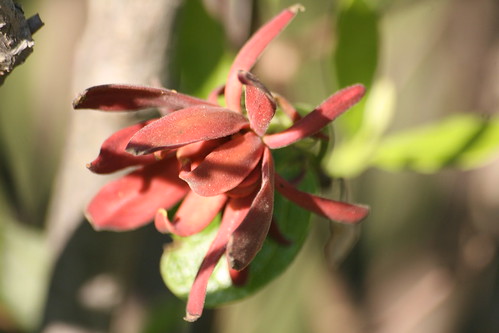
Appalachia's strawberry bush, Calycanthus floridus.
(*photo credit)
May 30, 2022 Contrasting Private Wealth to Commonwealth
The true friend of property, the true conservative, is he who insists that property shall be the servant and not the master of the commonwealth. The citizens of the United States must effectively control the mighty commercial forces which they themselves called into being. (Theodore Roosevelt, 1908)
Wealth is not of itself bad, for it is an accumulation of what is valuable by a given culture from the richness of God-given resources. What is threatening to a democratic people is wealth in the hands of individuals, whether public officials or the individual privileged billionaires. In either case these seek to act beyond the realm of public accountability. Due to the need for responsible oversight, democracy demands knowing and confronting influence that accompanies wealth in this age of globalization.
Commonwealth is a political unit (state, nation, etc.) founded on law and united by compact or tacit agreement of the people for the Common Good. Use of this title includes: the British Commonwealth, Commonwealth of Poland, Independent States (former Union of Soviet Socialist Republics) -- and four American states (KY, VA, Pa and MA) along with Puerto Rico. American citizens perceive little difference between commonwealths and states. However, combining the words "common" and "wealth" indicates responsibility by citizens who must work with a properly functioning government that defends the Commons. For the citizen, the term "commonwealth" triggers a spirited response, a sense of joint defense of the public interest, and a value in shared benefits. Kentucky prides itself in being a commonwealth.
Sound the alarm! Uncontrolled wealth in this globalized society has become so great that nations and people are subservient to the rule of plutocrats. Commonwealth advocates must speak up in the defense of democracy. Unfortunately, the myth against the benefits of government as such is great among libertarians; they overlook the host of totalitarian wealth-holders and the many who control money in a perverse manner, through tax-evading tax havens. The wealthy one-fifth of Americans are the most government-subsidized, not the poor one-fifth that the myth might imply.
Mutual benefits for the advocates of commonwealth means taming the influence of the privately wealthy. It also means holding accountable those entrusted with the national or other accumulated public wealth. Neither responsibility ought to be overlooked, for the Common Good demands vigilance. One is not better or worse than the other, for while wealth can benefit all, it can contaminate a few who become mesmerized by its power. Citizens must stay alert.
Prayer to Honor the Visitation: Lord God, give us an ever-deepening respect for the event of the coming of Mary to her cousin Elizabeth; this was at the time of Elizabeth's pregnancy with John the Baptist, who leaped with joy in the womb. Furthermore, both were pregnant, one with the prophet and one with the Messiah. May joy reign supreme! My soul proclaims the greatness of the Lord, my spirit rejoices in God my Savior.
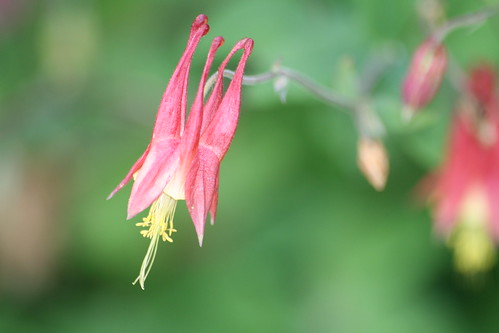
Aquilegia canadensis, Eastern red columbine.
(*photo credit)
May 31, 2022 Affirming the Principle of Environmental Commons
We need to share resources, because so many are destitute in this world. Our immediate task is to regulate the distribution of resources to the degree that they are needed to assist all of us (including future generations) to live worthwhile lives and to renew the face of our wounded Earth. The Common Good versus the individual benefit is the issue: social justice or individual self-satisfaction; non-profit motivation versus material profit motivation; and the public interest versus private interest. A win-win situation involves all people through sharing; when many take without giving then dissatisfaction festers and community is harmed. Sharing does not come automatically; it is a community-learned experience that some primitive societies and intentional communities have achieved. Can this be globally actualized?
The Common Good derives from the natural law and is the goal of all people of good will, who believe that benefits will come through communal sharing. The concept of Common Good has a long history of social justice development in Catholic and other Christian circles. However, the concept predates Christianity and is found in Greek and Roman writings and in rich expressions in other cultures as well. Primitive cultures regarded resources held in common for their mutual benefit as a "Common Good," whether articulated in a formal ethical manner or not. In our age of individualism, a return to communality is most difficult, but reclaimers of the Commons must transmit the good of primitive cultures back to our dysfunctional system. History can teach.
Radical sharing means all benefit and all participate. In order to share, creativity is needed because the outcome is in doubt, mutual support is weak, and barriers seem overwhelming. In some cases, social media becomes a barrier by promoting self-centeredness. On the other hand, modern communications break former isolation and discontent, and more people become conscious of inequalities in distribution of goods and services. The disparity of resources is evident, and counseling patience until goods and services trickle down is wearing thin. Discontent grows with escalating food prices, and persistent unemployment; the superrich become richer, and the poor and middle class are left behind, and again, more government funds go to the richest one- fifth, rather than the poorest one-fifth of American population.
Quality livelihood is a right of all people. Food producers ought to have access to sufficient land for family needs and livelihood. Productive land must be maintained properly through fertilization, erosion control, and zoning rules. Damaged land requires reclaiming; abandoned land needs to be resettled according to best practice and put to productive use or returned to a natural state. Fragile and non-productive land needs to be designated, monitored, and wildlife habitat maintained.
Magnificat: Mary, you gave us a golden message at the visitation: God has truly blessed you; all may see that blessing in the coming of the Messiah; those in high places will be bought low; and the lowly will find their rightful places. Your song is one of confirmation and revolution; your "yes" to God is the ultimate pro-choice decision in our world. Beg God to allow our daily reading of the Magnificat be ever more meaningful to us.
|